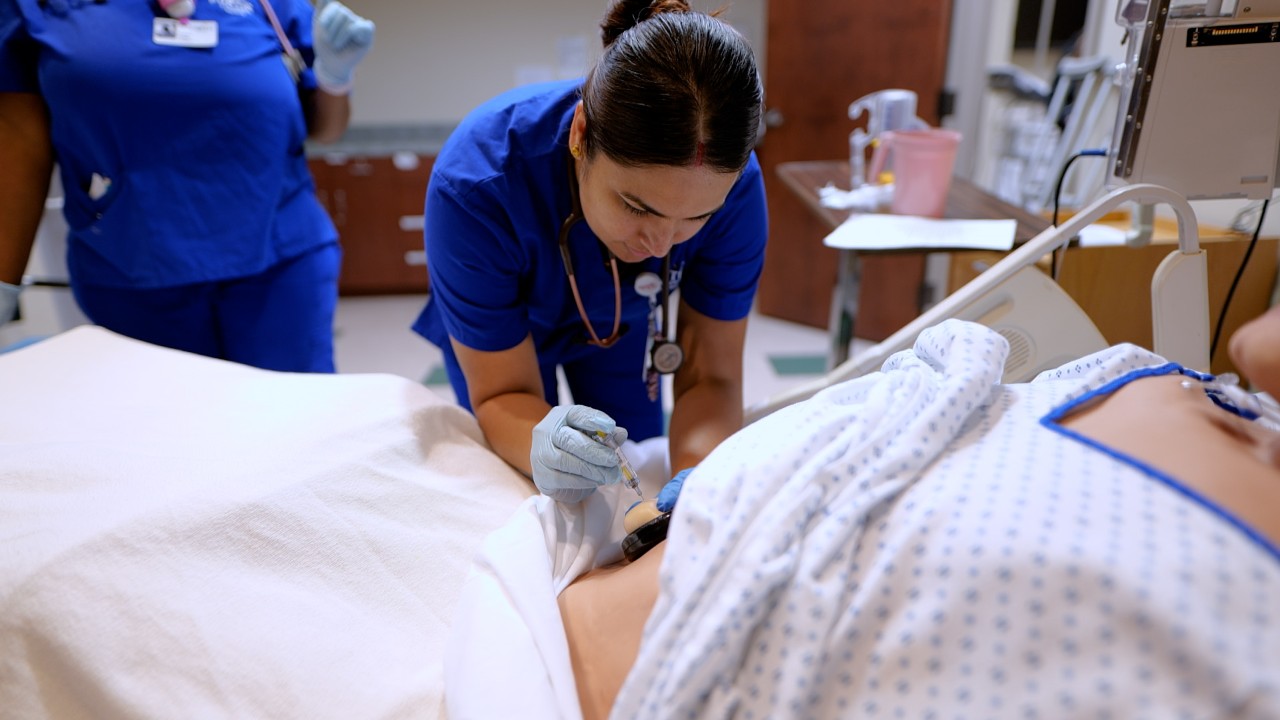How to Become a Diabetes Nurse
Roughly 1.4 million Americans are diagnosed with diabetes every year. Data from the American Diabetes Association also shows a staggering 96 million Americans have pre-diabetes.
With this chronic disease on the rise, patients need a knowledgeable ally to help them through the diagnosis, treatment, and recovery stages. Diabetes nurses are registered nurses who specialize and are credentialed in diabetes care. Their job is to educate diabetic patients and teach them healthy lifestyle techniques to manage their disease.
Nursing in general is an in-demand field, with several opportunities for advancement and to improve your earning potential. Want to know how to become a diabetes nurse? The career path begins by understanding the role, earning a nursing degree, gaining experience, and then choosing to specialize in this area.
What Does a Diabetes Nurse Do?
Diabetes nurses are tasked with several duties, including monitoring patients’ blood sugar, communicating with extended family members, and educating patients on management and prevention methods.
They also work closely with other healthcare professionals, like physicians and social workers, to ensure the patient has comprehensive care. Many diabetes nurses also offer emotional support, lifestyle counseling, and help in developing specialized care plans.
Some nurses go on to teach about diabetes care, whether it’s informally as a patient advocate or by earning an education specialist credential.
Steps to Become a Diabetes Nurse
Nurses who are interested in helping others live a healthier lifestyle should consider the following steps to become a diabetes nurse.
1. Earn a Degree
According to the U.S. Bureau of Labor Statistics (BLS), RNs can gain entry-level employment with an associate degree or a bachelor’s degree. Both of these degree programs include practical learning opportunities. And regardless of the degree, all nurses must be state licensed to gain employment.
The two-year Associate Degree in Nursing program (ADN) provides a foundation in hands-on clinical nursing skills and is a quicker route to this career. With the Bachelor of Science in Nursing program (BSN), students focus on more intensive nursing training over four years. Both programs incorporate classroom learning and practical lessons.
Before entering the workforce, nurses must become licensed. Nursing programs prepare students to pass the National Council Licensure Examination (NCLEX-RN), which is a standardized exam that tests your knowledge of nursing fundamentals, decision-making abilities, and practical skills application. Start the process by applying for licensure through your state’s board of nursing.
2. Develop Key Skills
Becoming a diabetes nurse requires a combination of specialized skills, such as:
- Compassion. Diabetes can be a challenging medical condition, so nurses should be empathetic to the needs of patients going through treatment.
- Problem solving. Diabetes nurses need to identify and resolve any potential complications, such as hypoglycemia.
- Communication. Nurses should be able to clearly and effectively communicate in a professional and calm manner.
- Attention to detail. This field requires precision, especially when it comes to treatment plans and monitoring of medication.
- Analytical abilities. When it comes to diabetes, these nurses will be called upon to carefully and accurately interpret patient data, such as blood glucose levels.
In addition to core nursing skills, diabetes nurses should have specific knowledge of diabetes issues, such as insulin administration, diet, exercise, nutrition, and blood glucose monitoring.
3. Gain Work Experience
Practical experience is a core component of a nurse’s career, and it has a direct impact on patient care. Nursing programs include hands-on coursework because it allows students to practice their skills in a controlled setting. Gaining work experience as a nurse demonstrates to employers that you are prepared for the field, whether it’s through exhibiting your communication skills, knowledge of medical procedures, or problem-solving skills.
4. Earn Certifications
Gaining certification is another way to demonstrate your level of expertise in diabetes nursing.
The Association of Diabetes Care and Education Specialists offers the Board Certified-Advanced Diabetes Management (BC-ADM) and Certified Diabetes Care and Education Specialist (CDCES) certifications. It’s important to note that the CDCES credential was formerly called the Certified Diabetes Educator (CDE). The BC-ADM credential is for master’s degreed nurses.
To qualify for the CDCES exam, RNs must have at least two years of professional nursing experience. They must also have a minimum of 1,000 hours in diabetes care and education within five years of the credential application. In addition, nurses must show proof of 15 completed continuing education hours related to diabetes care before taking the exam. This exam is administered through the Certification Board for Diabetes Care and Education.
Job Outlook for Diabetes Nurses
The U.S. Bureau of Labor Statistics (BLS) projects 6% employment growth for all RNs. This estimated growth, which spans 2022 to 2032, includes job increases in settings such as outpatient care centers and hospitals. The BLS notes demand for nurses is projected to increase because trained professionals are needed to assist the growing population of older adults and educate the public on chronic conditions, like diabetes.
Learn How to Become a Diabetes Nurse By Earning a Degree From Fortis
The path to becoming a specialized diabetes nurse may begin in a shorter amount of time; as soon as you decide to pursue any level of nursing education that can get the ball rolling. Fortis offers an Associate Degree in Nursing (ADN) program, which can prepare you to become a registered nurse in as little as two years. This robust program includes a mix of theoretical, laboratory, and clinical experiences, as well as courses on anatomy, physiology, and biology.
Explore how to start your nursing career, and learn how to advance your career to become a diabetes nurse. Read more about how Fortis nursing programs can help you pursue your professional goals.
Recommended Readings
6 Essential Clinical Nursing Skills
Nurses’ Essential Tools to Bring to Work as a New Grad
5 Ways Nurses Are Making a Difference in Patients' Lives


